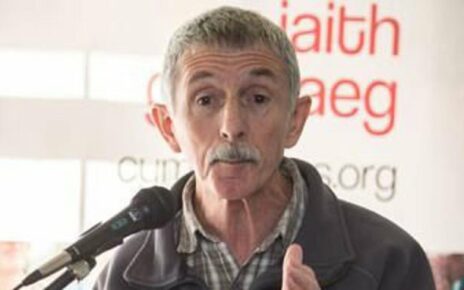Absorbing as they may be, the US Congressional hearings into the January 6 insurrection have told us a great deal more about something that we already knew: that Donald Trump tried to overthrow democracy in the US by fomenting a violent attack on the Congress.
While most of us have been preoccupied with his past, he’s busy working on his future. And on coming back with a vengeance.
Former US president Donald Trump in New York on Thursday.Credit:AP
In spite of everything, he remains the frontrunner for the Republican nomination to the presidency; the overwhelming majority of Republicans in Congress either support him or fear him; and he is the most formidable fundraiser in American politics.
And his public approval rating of minus 11 per cent is no worse than Joe Biden’s minus 12 per cent, according to the rolling poll average maintained by realclearpolitics.com.
Trump could face criminal prosecution, and he could just as likely be the next president of the US.
The former president considers himself frustrated in achieving many of his aims in his first term, betrayed by a “deep state” of public servants beyond his reach.
Trump could face criminal prosecution, and he could just as likely be the next president of the US.
He plans to fix that in his second: “The most important lesson Trump took from his first term relates to who he hires and to whom he listens,” writes Jonathan Swan, a political reporter for the US news outlet Axios, in a revealing new series on the former president’s plans.
“Trump has reduced his circle of advisers and expunged nearly every former aide who refused to embrace his view that the 2020 election was ‘stolen’.”
So wilful rejection of electoral reality is now compulsory in Trumpworld. And, as Swan reveals, he’s gone much further, planning a systematic, mass-scale purge of the permanent US public service to root out the so-called “deep state”.
Unlike a Westminster democracy, the American system reserves the uppermost echelon of the public service for political appointees. In Australia, a mere handful of senior officials will be replaced by an incoming government. The entire bureaucracy is supposed to be professionally apolitical.
Violent insurrectionists loyal to then-president Donald Trump stand outside the US Capitol in Washington on January 6, 2021.Credit:AP
In the US, about 4000 of the most senior public servants are political appointees and all of them typically are replaced by an incoming administration, a time-honoured turnover.
But Trump, unsatisfied with the traction he was able to establish over the federal public service, plans an assault on many thousands more using an untested mechanism called Schedule F.
It’s a plan to “radically reshape the federal government”, to stack it with loyalists to his “America First” ideology, writes Swan, formerly a political reporter with this masthead.
“The impact could go well beyond typical conservative targets such as the Environmental Protection Agency and the Internal Revenue Service. Trump allies are working on plans that would potentially strip layers at the Justice Department — including the FBI, and reaching into national security, intelligence, the State Department and the Pentagon, sources close to the former president say.”
US-based Australian journalist Jonathan Swan has written an extensive report for Axios delving into Donald Trump’s plans for a second term as US president.
According to Swan, a constellation of right-wing organisations are working with Trump to prepare a personnel pool of thousands ready to be tapped immediately should he win in 2024.
One of Trump’s recruiters, Andrew Kloster, has said: “I think the first thing you need to hire for is loyalty. The funny thing is, you can learn policy. You can’t learn loyalty”.
The personnel are also the policy, an echelon of ideological and policy loyalists who will deliver Trump’s agenda.
The head of one of the Trumpist talent-spotting outfits is Saurabh Sharma of American Moment. “He favours people who are protectionist on trade and anti-interventionist on foreign policy,” Swan writes. “They must be eager to fight the ‘culture war’. Credentials are almost irrelevant.”
We have been warned. These Biden years may be but a brief interregnum, a calm between two storms. And the second storm, according to these omens, would be more savage than the first.
For countries like Australia, this is a grave risk. The US alliance is founded on a shared interest in an open trading system and mutual assistance in case of war. Trump is opposed to both concepts.
Canberra will try to reassure itself on two grounds. First, it will point out that the alliance survived the first Trump presidency intact. But one of the Morrison government’s survival techniques was to emphasise dealing with a wide array of US government agencies, beyond the White House.
Australia sought to avoid the mad king in the castle by working through the saner barons and earls in Washington’s various federal fortresses. Pentagon Secretary Jim Mattis, for instance.
If Trump succeeds, there will be no more Jim Mattises. It will be impossible to avoid Trumpist America First fanatics. When Australia looks to America for help, there may be none forthcoming. That’s what America First is all about.
Second, Canberra will point out that Trump has a history of antagonism toward China. Even Trump’s America, surely, would stand with Australia in resisting Beijing’s ambitions.
Don’t be so sure. As Trump’s national security adviser, John Bolton, told me, Australia banned the Chinese communications champion Huawei first and Trump hesitated to follow. Why? Because Trump was holding out hope for a big trade deal with Xi Jinping.
“He was prepared to trade Huawei away for the ‘deal of the century’. Everything was on the table.” If he’d gotten the deal he sought with China, Australia would have been the only country to ban Huawei, left to face Xi’s retribution alone.
Trump would be prepared to sell out Australia’s interests in a heartbeat. And we know he has a special fondness for tyrants, Vladimir Putin, for instance. Trump recently complained that the US is spending too much to aid Ukraine.
And on Saturday, he told a Florida rally that he would not respect America’s NATO treaty in the event of an attack from Russia: “That’s right, I will not come to your defence,” he said, to the cheers of his crowd. So much for the defence of the free world.
More profoundly, Trump doesn’t believe in democracy. Disturbingly, many Americans seem resigned to a future without it. Fifty-five per cent of Democrat voters and 53 per cent of Republicans believe that “America will cease to be a democracy in the future”, according to a YouGov poll last month.
With Trump, anything is possible. Is Australia prepared?
The Morning Edition newsletter is our guide to the day’s most important and interesting stories, analysis and insights. Sign up here.
Most Viewed in World
From our partners
Source: Read Full Article




